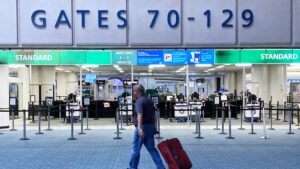Government Shutdown Looms Just Before Holiday Travel Season: What You Need to Know
As we gear up for the bustling holiday travel season, a potential government shutdown is casting a shadow over airport operations and travelers’ plans. With a contentious political landscape, lawmakers have been unable to reach an agreement, leading to a significant vote against a short-term funding bill backed by President-elect Donald Trump. If a resolution isn’t found, we may see a government shutdown as early as 12:01 a.m. ET on Saturday. This situation has implications for the more than 40 million travelers projected to fly between now and the New Year.
Implications for Air Travel
Despite the looming crisis, air travel is expected to continue. The airlines are bracing for the busiest holiday season on record. United Airlines estimates it will carry approximately 9.9 million passengers between December 19 and January 6, marking a 12% increase from the previous year. As air travel increases, the Transportation Security Administration (TSA) has informed the public that over 14,000 air traffic controllers and almost 60,000 TSA agents are classified as essential personnel, meaning they will continue to work even if they are not compensated during the shutdown.
What Travelers Should Expect
While flights are expected to proceed as scheduled, passengers should prepare for potential delays. TSA Administrator David Pekoske advised via a post on social media platform X that although personnel are currently geared up to handle a high volume of travelers, an extended shutdown could result in longer wait times at security.
The TSA’s continued operation underscores the gravity of air travel safety; security measures have always been a top priority, but keep in mind that without proper funding, resources may become strained.
Historical Context: Lessons from the Last Shutdown
Reflecting on past experiences, the last government shutdown lasted over a month, from late 2018 into early 2019, and it brought significant challenges to air travel. During that period, a small number of air traffic controller callouts severely impacted operations in one of the nation’s busiest airspaces, leading to significant delays. Fortunately, a bipartisan deal was reached to reopen the government, but the disruption highlighted the vulnerabilities within air travel during such shutdowns.
The Extreme Investor Network Perspective
At Extreme Investor Network, we believe that the potential disruption of a government shutdown could have rippling effects on various sectors linked to the travel and tourism industry. Investors should keep a close eye on airline stocks, TSA operations, and related businesses providing travel services. Moreover, it’s crucial to assess how these developments could influence consumer sentiment around travel spending as we head into the critical holiday season.
Many travel-related businesses and stakeholders are mumbling about the repercussions of a shutdown, and understanding these dynamics will be key for savvy investors looking to navigate the volatile landscape.
As always, staying informed is your best strategy. Follow us at Extreme Investor Network for real-time updates and expert analyses that go beyond the headlines, ensuring you’re equipped with the knowledge to make informed decisions in this fluctuating environment.
Conclusion
With critical decisions looming on Capitol Hill, the time is ripe for travelers and investors alike to consider the ramifications of a potential government shutdown. Whether you’re planning holiday travels or managing an investment portfolio, the impact of these political dynamics will be felt across various sectors. Stay ahead of the curve with insights and updates from Extreme Investor Network, your trusted source for all things business and investment.

